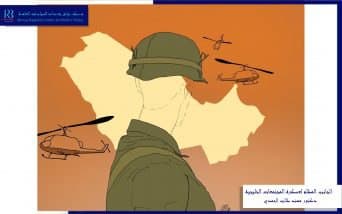 2020 / 14 / Oct
2020 / 14 / Oct
The potential dark side of the militarization of Gulf societies
Dr. Muhannad Talib Al-Hamdi
Professor of Economics and Political Science, Kansas State University, USA.
The economic repercussions of the spread of the coronavirus pandemic call into question the ability of the Gulf states to finance a costly regional arms race. In turn, this reshapes not only their geopolitical position, but also efforts to make the military a pillar of a new national identity at a time when these countries are forced to renegotiate outdated social contracts.
The significant decline in the financial revenues of the Gulf states, as a result of the collapse of oil and natural gas prices and the significant decline in global demand for fossil energy sources, raises the question of whether countries such as Saudi Arabia, the United Arab Emirates and Qatar can maintain the level of huge military expenditures that made them ranked among the highest spending countries in the world in the military field and the purchase of weapons.
Saudi and Emirati military spending is known to be driven by a perceived need to counter Iran's progress in developing ballistic missiles and drones as well as a potential nuclear military capability and the increasing activity of its proxies in Arab countries. Qatar joined the arms race in the Gulf recently in what appears to be a reaction to the economic and diplomatic boycott that began three years ago, led by Saudi Arabia and the United Arab Emirates, of this small Gulf state with great regional influence.
Another driver of this growing military spending is the attempt to make the military a force for creating an inclusive national identity based on patriotism rather than religion or tribal heritage in order to help lay the groundwork for an eventual, potentially painful transition for these countries' societies, to more organized and diversified post-oil economies.
The introduction of compulsory military service for males in the UAE, Qatar, and Kuwait over the past decade, and the recent Saudi decision to open the door to voluntary military service for women, created the general climate to achieve this goal in addition to supporting the efforts of governments to expand the participation of citizens in the labor force at the expense of expatriate workers and expatriates, including service in the armed forces.
These steps constituted a break with the past, which was characterized by the great distrust of Arab rulers in the political positions of their armies and used various methods to protect their regimes and themselves from attempts supported by the army or carried out by itself to remove them from power.
The decision-makers in the Kingdom of Saudi Arabia and the United Arab Emirates expected that their military intervention in Yemen and the UAE's participation in the Western military intervention in Libya to remove Muammar Gaddafi's regime would enhance the prestige of the army by achieving quick and decisive victories. But five years into the seemingly endless war, the misguided intervention in Yemen has had mixed results at best. So have the recent efforts to overthrow the Islamist-tinged Libyan Government of National Accord (GNA), which is backed by Turkey and is a front for the Muslim Brotherhood.
The UAE, described by former US Secretary of Defense Jim Mattis as little Sparta, withdrew partly from the Yemen war in an attempt to reduce the losses that were affecting its forces there. Moreover, the Emirati forces have suffered the death of dozens of Emirati soldiers and citizens, which is a high number compared to the number of citizens of only 1.4 million out of about 10 million residents in the country. As a result, the UAE is increasingly relying on recruiting fighters from other nationalities.
However, the position of the forces of the United Arab Emirates may have been better off than the Saudi army, which has lost much, at least internationally, of its image that the authorities in that country have tried to build for decades. Recently, Saudi Arabia seems to have started tacitly acknowledging that the Yemen war cannot be won militarily. Recently, media reports have indicated that the Saudi government has begun to reduce funding to the internationally recognized Yemeni government of President Abd Rabbo Mansour Hadi, which Saudi Arabia is heavily supporting.
The method of war carried out by the Saudi forces in Yemen included attacks on multiple targets, including civilian sites, which led to the exhaustion of the country's economic and civil infrastructure and made Yemen live one of the largest humanitarian disasters in the world. Likewise, UAE-backed Libyan fighters led by Field Marshal Khalifa Haftar suffered a similar fate. More than a year ago, Field Marshal Haftar made promises to carry out a quick and sudden attack to occupy the Libyan capital, Tripoli, which proved to be nothing but illusions. The forces affiliated with the Turkish-backed Government of National Accord were able to make its fighters switch to a defensive stance instead of attacking.
Decision-makers in the Kingdom of Saudi Arabia and the United Arab Emirates place their hopes on focusing on the values associated with the homeland and the role of the armed forces, such as a sense of citizenship, sacrifice, discipline, duty, and the concept of a model citizen with a heroic image in order to enhance the people’s appreciation for the army despite its checkered performance record. For now, that focus appears to be fulfilling part of those hopes.
The Kingdom of Saudi Arabia has successfully achieved broad popular support for the Saudi armed forces and their contribution to the Yemen war, despite widespread international criticism, by glorifying the patriotic sacrifices made by members of the Saudi armed forces, generously compensating the families of fighters who were injured or killed in the Yemen war, and establishing multiple institutions to guarantee the rights of retired warriors. The UAE has institutionalized the process of honoring military martyrs. Ultimately, however, the mixed record of the performance of the Saudi and Emirati military raises questions about the level to which these forces can present themselves as institutions capable of carrying and transmitting the values of the new national identity.
In the same vein, the question is whether citizens in countries like Saudi Arabia, who have been forced to grapple with painful cuts in social spending without there being a clear measure to ensure that society's elites share the burden, will continue to support their governments' massive military spending drive at a time of fiscal austerity.
If social media has anything else to offer us, it is understanding the general trends in a country. By following the trends of Saudi public opinion on social media platforms, the dominant trend was the praise of Saudi citizens for their government because it guaranteed the return of Saudi citizens who were stuck outside the Kingdom at the beginning of the spread of the Corona virus epidemic, and funded quarantine operations to prevent the spread of the virus, and supported private sector salaries that were affected by the closures by up to 60%.
However, a good number of the middle and lower class have expressed concern about who will bear the brunt of the economic fallout from the spread of the pandemic and questioned the feasibility of continued investment in non-obvious investment opportunities such as English football club Newcastle United by the Public Investment Fund, the kingdom's sovereign wealth fund. So far, the issue of military spending has not come into question.
What probably makes matters more complicated is the fact that the majority of Emirati and Saudi casualties in the Yemen war hail from the less developed and economically fortunate regions of the UAE and some regions of Saudi Arabia that are inhabited by religious minorities with a history of feeling disenfranchised. As a result, we will have to wait and see if applying for military service will ultimately narrow or widen social gaps.
Ms. Eleonora Ardimani, associate research fellow at the Italian Institute for International Political Studies and professor at the University of Milan and expert on Gulf affairs, warned of the potential increase in the militarization of societies in the Gulf states, saying: “Militarization enhances the security of the regime, and thus serves national security on more than one level…However, growing national sentiments are likely to reinforce regional polarization.”
Ms. Ardimani's warning focuses on the danger of militarization that could entrench differences between the Gulf states. The question is whether the strengthening of militarization, which has so far succeeded in strengthening local cohesion, could have, in more severe circumstances, a reverse side that could lead to societal polarization instead of creating social cohesion.

Dr.. Muhannad Talib Al-Hamdi Dr.. Muhannad Talib Al-Hamdi Dr.. Muhannad Talib Al-Hamdi